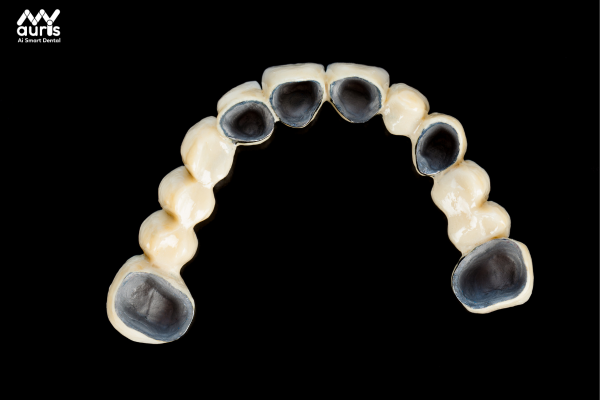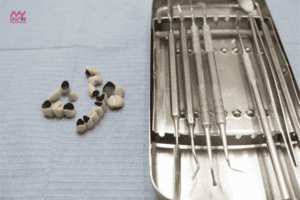Titanium alloy ceramic dental restorations are chosen by many people and are popular today. Porcelain teeth help restore teeth, improving both aesthetics and better chewing function. If you are wondering what type of porcelain teeth you need to restore, let’s learn more about titanium alloy porcelain teeth with My Auris dentistry in the following article.
What are titanium alloy porcelain teeth?
Titanium alloy porcelain teeth with an inner frame made of titanium alloy, covered with porcelain on the outside, are light, sturdy, hypoallergenic and highly biocompatible. This makes titanium alloy porcelain teeth highly appreciated for their durability, safety and aesthetics.
Titanium alloy porcelain teeth are suitable for restoring teeth that are chipped, broken, worn or partially or completely lost. It is also widely used in making dental bridges, crowns and implants. This method not only brings natural aesthetic results, but also ensures safety and long-term effectiveness for patients.
The unique combination of the durability of titanium alloy and the beauty of porcelain makes titanium alloy porcelain teeth a superior and reliable choice in recreating a perfect and confident smile for everyone.
Titanium porcelain teeth are composed of 2 parts:
- The internal frame of porcelain teeth is made from a nickel-chromium-titanium metal alloy, in which the titanium component ranges from about 4-8% depending on the type. With the presence of titanium in the frame, porcelain teeth are light in weight and less susceptible to corrosion.
- The outer layer is covered with thin layers of Ceramco 3 porcelain to provide a natural beauty and color similar to real teeth.

Titanium is considered a precious material widely used in dentistry and aerospace technology. Because titanium is almost the strongest among metal materials, moreover, it also has very good resistance to corrosion and force. Therefore, titanium was introduced into the dental field early, in the 1960s.
Titanium porcelain teeth possess many advantages to help overcome many situations of chipped, dull, weak, damaged teeth,…
How many types of titanium alloy porcelain teeth are there?
As mentioned, titanium ceramic teeth will have fluctuating composition depending on the type. Therefore, everyone should learn about types of titanium porcelain teeth to choose the right one. Currently, there is on the market3 types of titanium alloy porcelain teeth are commonly used:
Titan Vita porcelain teeth
This is a porcelain tooth researched and produced by Vita company, in Germany. The characteristic of this porcelain tooth is its high titanium content of up to 8%. And the outside of the porcelain teeth is covered with high-quality porcelain to show aesthetics.
The advantages of these porcelain teeth are that they are lighter than many other types of porcelain teeth, highly durable, safe for surrounding tissues, do not cause changes in the oral cavity environment and ensure effective chewing.
Titan Berlin porcelain teeth
This titanium alloy porcelain teeth has a frame made from Titanium Tilite alloy from the United States and the outside is coated with Ivoclar porcelain from Germany.
The advantage of these porcelain teeth is their extremely high hardness, ensuring chewing ability better than real teeth. At the same time, long service life. In particular, the ability to blacken the gum line may be slower than other titanium ceramic lines.
Titan Margin ceramic teeth
This ceramic tooth has a frame made from titanium alloy and an outer shell coated with Margin ceramic. This is the most highly rated titanium ceramic line.
The advantage of this porcelain tooth is that it is moderately expensive and does not darken the gum line. At the same time, the shape, size, and color of the teeth are close to real teeth.

Should titanium alloy porcelain teeth be chosen for restoration?
Currently, there are many types of porcelain teeth on the market, thus causing confusion for consumers. People don’t know which type to choose and the same goes for titanium alloy porcelain teeth.
Each porcelain line will have its own advantages and disadvantages. Customers consider their tooth condition, needs, preferences, and financial conditions to choose the appropriate type. The doctor will also advise customers on some types of porcelain teeth so they will feel more secure.
Whether or not you should choose titanium porcelain teeth in dental restoration depends on each person’s decision. If you are still wondering, you can learn more about the advantages and disadvantages of this line of porcelain teeth. From there, make the best decision.
Advantages of titanium ceramic teeth
Titanium ceramic teethUsed up to now, it is still favored by many people because of its many outstanding advantages as follows:
- Light weight: Titanium porcelain teeth are lighter in weight than other types of metal porcelain teeth, so they are often chosen for restoration of the upper teeth. In particular, it is suitable for making long porcelain bridges to avoid the bridge falling due to being too heavy.
- Safe, benign material, difficult to oxidize: titanium is inherently a benign metal, along with a safe outer ceramic layer, so it does not cause any allergic reactions or irritation in the oral cavity environment, even for people with sensitive skin. Furthermore, titanium is difficult to oxidize, so it can be used for a long time. And when the titanium ceramic crown comes into contact with the gums, alveolar bone or soft tissue, it has no effect and maintains a certain level of safety.
- Durable, good load-bearing: Titanium porcelain teeth are hard, ensuring comfortable chewing, without worrying about porcelain teeth being chipped or broken during use.
- High biocompatibility: Porcelain teeth are not eliminated during use.
- Reasonable cost: the price of titanium ceramic dental restorations is more economical and reasonable than many other types of ceramic while still ensuring quality.

Disadvantages of titanium ceramic teeth
Besides the advantages, titanium alloy porcelain teeth still have some disadvantages that people should consider before choosing restorations:
- Aesthetics are not as high: Titanium porcelain teeth are not as aesthetically pleasing as all-ceramic teeth. Because the structure of teeth has a metal frame, it cannot be as white and clear as all-ceramic teeth. Under light or black light, you can see that the gum edges are darkened by the shadow of the metal frame.
- Blackening of the gum line: although the oxidation rate is slower than other metal-ceramic teeth, after time it still oxidizes, causing blackening of the gum line, leading to loss of aesthetics.
- Longevity is not high: Titanium porcelain teeth, on average, will have to be replaced after 5-7 years of use because the black edges of the gums are not only unsightly but sometimes also absorb saliva, causing an unpleasant odor.

Thus, titanium porcelain teeth still satisfy aesthetics and chew well when choosing tooth restoration at a reasonable price. However, if anyone requires high aesthetics, they should not choose titanium porcelain. If you want both aesthetics and cost savings, you can choose Restore titanium alloy porcelain teeth for the inner molars to ensure good chewing. As for the front teeth, you can choose all-ceramic teeth to maintain long-term aesthetics.
Hopefully, the information in the article about titanium alloy porcelain teeth will help people understand more about this type of titanium porcelain teeth that can be restored Many tooth conditions, meeting customer requirements. To choose quality porcelain teeth and correct restoration techniques, choose a reputable and quality dentist.
If you still have concerns, please contact My Auris dentistry immediately for more detailed advice and answers about porcelain teeth. okay.
Anh Thy





